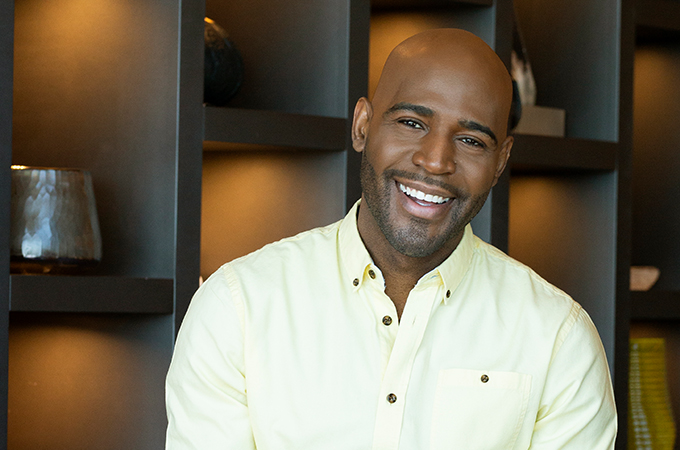On November 16, students gathered around their computer screens to listen to reality-television personality and mental health advocate Karamo Brown speak about LGBTQ rights and social justice. Associated Students of the University of Redlands (ASUR) Vice President of Convocations and Lectures Andrew Barillas ’23, Black Student Union President Amanda Chiles ’21, and Pride Center Intern Helena Elkins ’21 moderated the event.
“I’d like to thank everyone here for joining us today—I know this isn’t a normal conversation because, in 2020, nothing is normal,” said Barillas. “Karamo believes that, by exploring our difficulties and having hard conversations with ourselves and one another, we can adjust our mindset and heal emotionally.”
In 2004, Brown became the first openly gay Black man to appear in a reality television show when he was cast in MTV’s The Real World: Philadelphia. Since signing on as the culture expert for Netflix’s Queer Eye, which premiered in 2018, he has become a published author and launched a podcast in which he helps guests identify, explore, and communicate their emotions.
Throughout the event, Brown reflected on his own processes of overcoming adversity and lifelong learning, while also responding to students’ questions about toxic masculinity, boundaries, and representation in Hollywood.
In response to a question about holding friends and family members accountable for their actions and having other difficult conversations, Brown encouraged attendees to adopt a mindset of empathetic listening. This approach requires people who are interacting to offer an equal amount of respect to each other in order to be understood on deeper mental and emotional levels.
He also emphasized the importance of maintaining boundaries and holding strong to one’s personal identity when interacting with family members who might be combative or cruel. “The most important thing is protecting yourself,” he said, noting that every situation should be approached with care for your mental, emotional, and physical health.
Expanding on this idea, Brown said: “I don’t subscribe to the term ‘coming out.’ I believe the actual process is letting people in. That’s what you’re doing—you’re deciding on who you want to let into your life. Whether it’s regarding your sexuality or gender identity, you’re letting people in because you trust them, you love them, and you know they’ll support you and uplift you.”
Guiding the conversation toward the topic of intersectional representation in Hollywood, Barillas asked Brown how young people can influence the industry to cast LGBTQ-identifying actors in roles for LGBTQ characters.
In response, Brown said that audiences have the power to change the demographics of Hollywood by deciding what they will and won’t support with their wallets. “We see constantly,” he said. “We saw it with Crazy Rich Asians and Black Panther—these are the highest-grossing films because when you have people represented and running the show, we’ll show up with our money.”
Commending members of Generation Z for using their voices to demand justice, Brown explained that it’s also important to look at representation behind the camera to ensure a diverse array of stories are being written and told. Taking the conversation one step further, he offered two-pronged advice to young activists:
- Take time for yourself. “You have so much weight on your shoulders,” he said. “Make sure you take the time to focus on yourself—it’s okay to take a break.”
- Don’t give in to cancel culture. Brown encouraged students to work to rehabilitate relationships and facilitate a “counsel culture,” which he described as an environment that holds people accountable for their actions rather than shaming them.
In closing, Brown took a question from a student who asked how to measure how you’re doing amid the circumstances of the COVID-19 pandemic. He responded: “It’s very easy, especially when you’re in college, to look at the grades other people are getting, where they’re living, what relationship they’re in, if they’re getting married, what school they’re going to next. Don’t compare yourself to them because, at the end of the day, what you have and who you are is enough.”
Learn more about ASUR and Campus Diversity and Inclusion.






